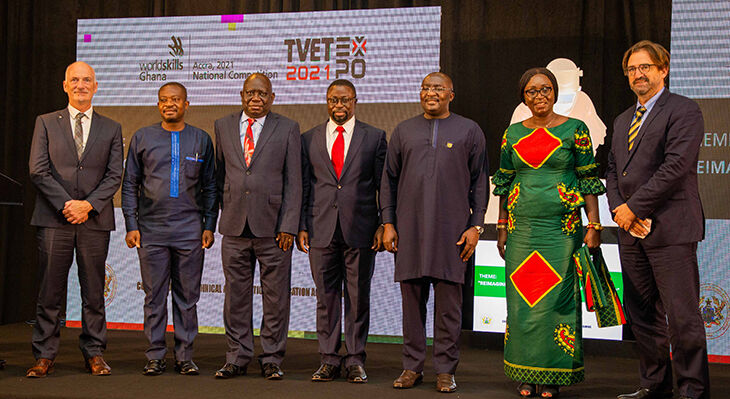Ghanaian vocational education and training system in transformation
29.12.2021
One year after introducing comprehensive TVET reforms, Ghana uses the TVET Expo to take stock of the situation. What has been achieved in the meantime? One result of this work is the first Ghanaian Vocational Education and Training Report, which has been prepared with support by GOVET.


The Ghanaian system for Technical and Vocational Education and Training (TVET) has been undergoing a continuous process of change since widespread reforms were introduced at the end of 2020. Prior to the Education Regulatory Bodies Act, the system had been highly fragmented and had operated under the auspices of 19 ministries. The Commission for Technical and Vocational Education and Training (CTVET) has been the central Ghanaian VET authority since the reform. It is responsible for the governance, further development and monitoring of the TVET system in Ghana. Just over a year after the act entered into force, the “2021 TVET Expo” provided an ideal opportunity to draw initial conclusions and present the latest changes.
The event was opened by Dr. Mahamudu Bawumia, Vice President of the Republic of Ghana. In his speech, the Vice President emphasised the importance of vocational education and training for the country’s industrialisation and for the creation of jobs for a young population. Referring to the government’s “Ghana beyond aid” strategy, he explained that trained skilled workers represented the only means via which Ghana could fulfil its goal of gaining independence from international investors. He pointed out that TVET was the foundation for this and outlined his vision of making Ghana a county of TVET excellence in West Africa.
Deputy Minister of Education Gifty Twum-Ampofo, who is in charge of TVET, drew attention to the significance of the restructuring process being pursued since the start of the year. Responsibility for vocational education and training institutes had previously been distributed across 19 ministries, but all these bodies now fell within the remit of the Ministry of Education. She hailed the process as a major step forward which would lead to higher quality and better coordination and would result in a VET system that was stronger in overall terms. It meant that national strategies such as the “Free Senior High School” Programme, which provides young people with access to upper secondary education free of charge, could now be rolled out fully to encompass all TVET institutes.
Validation of the first Ghanaian Vocational Education and Training Report
Nevertheless, hardly any reliable and publicly accessible sources have been available with regard to answering the question of just how competitive the Ghanaian VET system really is. How many young people opt for this education pathway in the first place, and which training programmes can they choose? How is the system structured financially, and what is the situation in respect of implementation of the strategies which CTVET have adopted for the sector, e.g. the realisation of so-called “competency-based training courses” or provision of practical placements within the scope of training (workplace experience learning)?
The first Ghanaian Vocational Education and Training Report addresses both these topics and further issues. GOVET has been advising the Ghanaian Commission for TVET (CTVET) on the preparation of the report over a period of eighteen months. The aim of the Vocational Education and Training Report is to consolidate basic figures, data and facts relating to the VET system in Ghana and to make these available to the general public.
The existing draft of the Vocational Education and Training Report was subjected to close scrutiny during a validation workshop involving VET stakeholders, which was staged as part of the programme of events at the three-day TVET Expo. Samuel Thompson, Head of the Projects, Planning, Reporting, Monitoring and Evaluation Department at the CTVET, presented the core results of the TVET Report. Experts from the education sector and from trade and industry discussed various thematic aspects. Although they came up with proposals for short-term adaptation, they also raised important questions of understanding. Numerous indications regarding the requirement for further information were addressed and discussed for future reports. One example here was the need for a more precise breakdown of financial resources. All responses were documented before being presented by the groups in a plenary session. This feedback will subsequently be used to enhance the report. At the end of the validation workshop, CTVET’s Director General Dr. Fred Kyei Asamoah stressed the importance of this networking for the integration of stakeholders. This helped to improve the report’s acceptance and visibility.
TVET transformation – the current situation and the future of vocational education and training in Ghana
The fact that a qualitative and transparent reporting system will provide the basis for further development of vocational education and training in Ghana was also apparent on the third day of the TVET Expo. CTVET outlined the latest status of implementation of several initiatives and policies and debated these with participants representing trade and industry, the social partners and the VET sector. The Vocational Education and Training Report had permitted the development in vocational school pupil numbers to be highlighted. This figure had tripled between 2015 and 2020 to reach approximately 100,000 by the latter date. General TVET conditions also play an important role in the report. One example in this respect are the initiatives aimed at achieving better waste separation at the institutes (“Greening TVET”). As the report made clear, these are not yet effective at a third of all institutes. When surveys are conducted, many institutes tended to take a positive view of the way in which training institutes are linked with trade and industry. This assessment from within the sector comes as somewhat of a surprise given the fact that vocational education and training has displayed too little in the way of practical orientation thus far. Dr. Fred Kyei Asamoah, Director General of CTVET, underlined the importance of close cooperation between trade and industry, the government and research and teaching. He felt that this needed to be further reinforced in order to structure the VET system better.
CTVET presents successes and results
In the TVET Transformation Forum, CTVET provided a summary of previous successes and of the steps completed.
- Conclusion of revision process to bring all vocational education and training institutes under the umbrella of the Ministry of Education.
- Eleven Sector Skills Bodies have been inaugurated in order to integrate trade and industry more effectively (eleven more to be inaugurated).
- A procedure for the recognition of competencies acquired by non-formal and informal means has been piloted and will now be introduced (Recognition of Prior Learning, in close cooperation with the German Agency for International Cooperation, GIZ).
- Campaigns to enhance the image of TVET are running successfully (MyTVET, WorldSkills).
- Many training institutes and Technical Universities are currently receiving new equipment and materials (in some cases as a result of sponsoring by China).
- Establishment of the Akenten Appiah-Menka University of Skills Training and Entrepreneurial Development (AAMUSTED), an institute of higher education for VET staff.